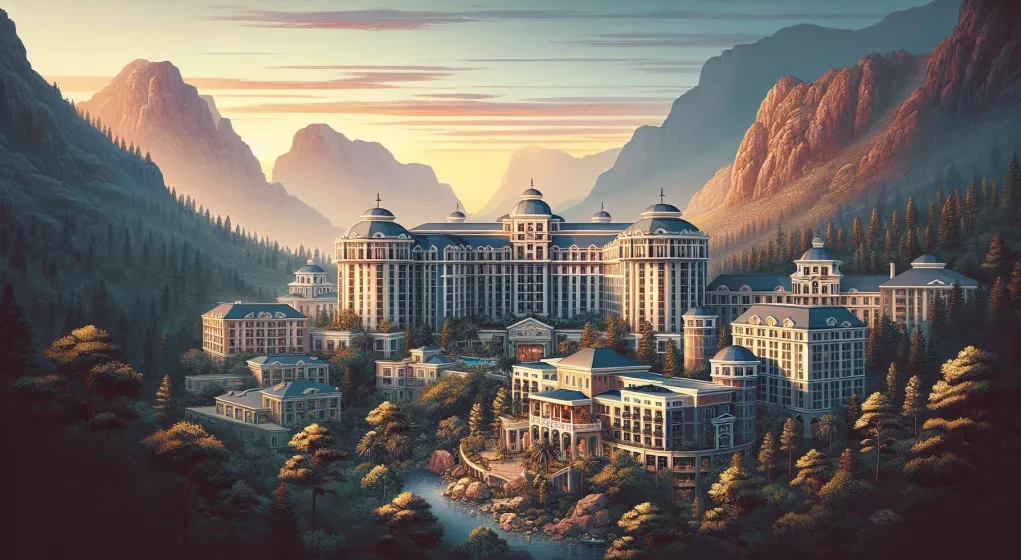Nestled among the verdant peaks of the Titiwangsa Mountains, Resorts World Genting, a spectacle of leisure and luxury in Malaysia, has recently dimmed the lights in two of its iconic gaming establishments. The traditionally bustling Circus Palace and Hollywood casinos now stand in unexpected silence, with succinct notices adorning their entranceways, guiding visitors towards the SkyCasino for their gaming expeditions.
The ghostly quiet of the now-vacant facilities follows a cryptic amending of the resort’s website on February 28. Revelations came with nary a whisper; the description and allure of Circus Palace and Hollywood had vanished, as if erased by the night’s soft cloak. Malaysian media whispers grew into murmurs of finality, conjecturing that these closures might herald an irreversible end.
In the shadow of the pandemic, these grand halls had failed to recapture their former glory, their siren calls for patrons lost amidst the din of uncertainty. Even as the fading resonance of slot machines and shuffle of playing cards lingered in memory, Resorts World issued a late counsel that suggested perhaps these closures were not the death knell many had feared but a suspended animation during a transformative period.
_”In our ongoing effort to enhance the splendor and enjoyment of our offerings, we are committed to continuous improvements,”_ the announcement intoned. _”This includes the temporary cessation of certain casino operations to allow for these enhancements to take shape.”_
For now, the singular heart of gambling within the resort beats within the modern chambers of SkyCasino, sprawling across two levels that symbolize progress and rejuvenation.
Resorts World Genting’s saga began in 1965, a mere eight years post Malaysia’s emergence from the folds of British dominion. Lim Goh Tong, an ambitious Malaysian entrepreneur, secured an exclusive casino license, a gem of opportunity that the nation’s government bestowed. The caveat was distinct: only non-Muslim Malaysians and international guests were to cross the thresholds, and the casino would enjoy its own ecosystem, far removed from the metropolitan thrum of a major city.
Lim’s journey led him to a lofty cradle north of Kuala Lumpur, Genting Sempah, whose namesake would encapsulate both his resort and the corporate titan that is Genting Group. His legacy cemented him as Malaysia’s richest man, boasting a fortune that soared beyond $4 billion. Upon his passing in 2007 Lim Kok Thay, his progeny, assumed the mantle, steering the Genting Group onward.
Resorts World Genting has now become but one star in a constellation of Genting’s global casino resorts, shining from Singapore to the United Kingdom, the Philippines, and the newer displays in the United States, including the splendorous Resorts World Las Vegas on the notorious Strip which made its grand debut in June 2021, costing a staggering $4.3 billion.
Yet, in the grand tale of Genting’s ascent, there lies a chapter of regret. The company, in its worldwide conquest, missed its spear at the heart of Macau’s gaming empire during its prime renaissance. Their audacious attempt at weaving into the fabric of Macau’s existing dynasty during the 2022 renewal of gaming concessions saw Genting excluded, as the city state clung to its sextet of casino rulers.
Similarly, the siren call of Japan, which once beckoned with the promise of Yokohama, faded into silence for Genting as the city withdrew its bid, prompting the conglomerate to fold its aspirations in the land famed for the rising sun. They were not alone in their retreat, as juggernauts like MGM Resorts advanced on Osaka while titans such as Las Vegas Sands, Wynn Resorts, Caesars Entertainment, Hard Rock, and Melco Resorts receded from the Japanese horizon.
In a world that gambles with the fickle favor of fortune, Resorts World Genting remains both a symbol of legacy and a testament to the indomitable spirit of chance.






